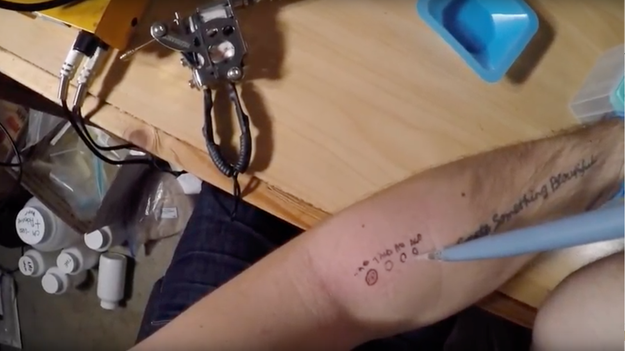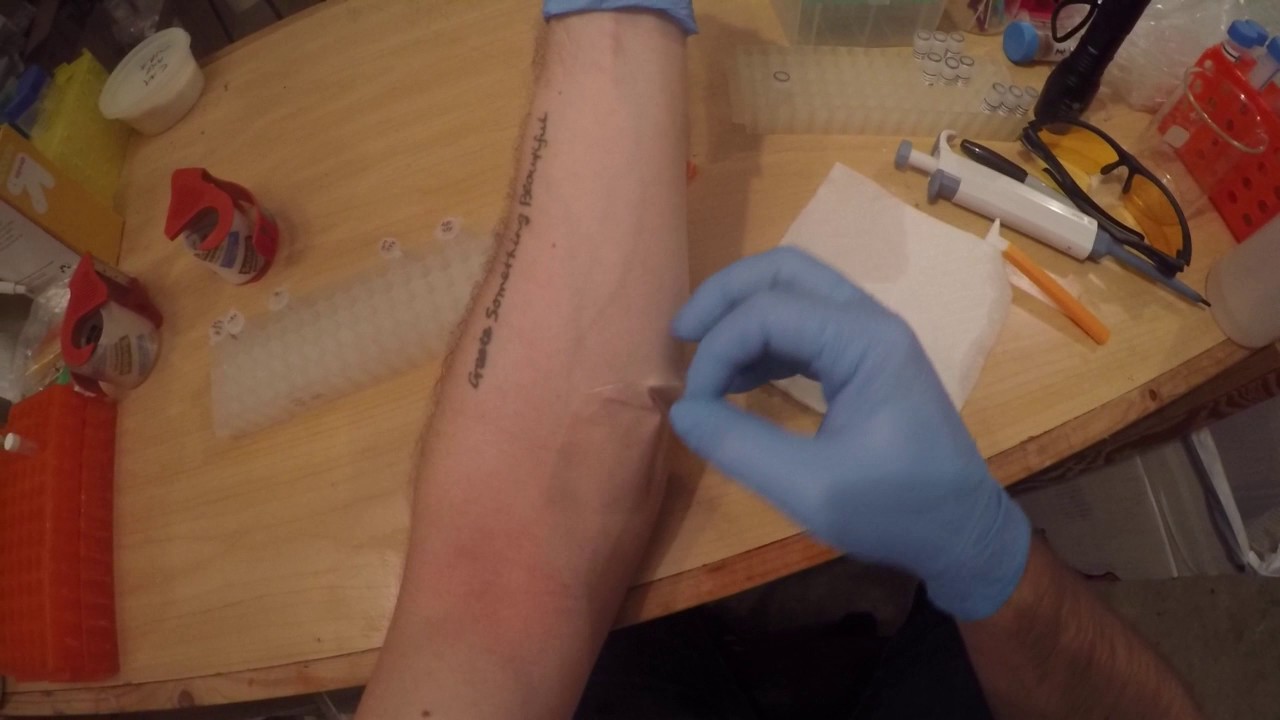
Allyson Laquian / BuzzFeed News
Josiah Zayner, CEO of the biohacking-promoting startup the Odin, held up a syringe. “This will modify my muscle genes to give me bigger muscles,” he told a packed room at a biotech conference in San Francisco in early October.
In front of dozens of onlookers, he leaned against a table and jabbed the long needle into his left forearm. Then he took it out, wincing a little, and added, over applause and chuckles of disbelief, “I’ll let you know how it works out.”
Zayner has made headlines for pushing the boundaries of do-it-yourself genetic experimentation, whether by trying to clean up his gut by inoculating himself with a friend’s poop or brewing glow-in-the-dark beer. This time, the biohacker claims he’s the first person trying to modify his own genome with the groundbreaking gene-editing technology known as CRISPR. And he’s providing the world with the means to do it, too, by posting a “DIY Human CRISPR Guide” online and selling $20 DNA that promotes muscle growth.
But editing your DNA isn’t as simple as following step-by-step advice. Scientists say that injecting yourself with a gene for muscle growth, as Zayner’s done, won’t in fact pump up your arms. Zayner himself admits that his experiments over the last year haven’t visibly changed his body. There are safety risks, too, experts say: People could infect themselves, or induce an inflammatory reaction.
But to Zayner, whether or not the experiment actually works is besides the point. What he’s trying to demonstrate, Zayner told BuzzFeed News, is that cutting-edge biology tools like CRISPR should be available to people to do as they wish, and not be controlled by academics and pharmaceutical companies.
“I want to live in a world where people get drunk and instead of giving themselves tattoos, they’re like, ‘I’m drunk, I’m going to CRISPR myself.’”
“I want to live in a world where people get drunk and instead of giving themselves tattoos, they’re like, ‘I’m drunk, I’m going to CRISPR myself,’” said Zayner, who has a few tattoos of his own, in an interview with BuzzFeed News. “It sounds crazy, but I think that would be a pretty interesting world to live in for sure.”
Under the Food and Drug Administration’s rules, his experimenting appears to be legal — or at least, not illegal. But it’s less clear to what extent, if any, Zayner is responsible for any harm to people who copy him. It’s a gray area that the FDA doesn’t regulate, and may become more pressing as amateur scientists disseminate their experiments, methods, and equipment online.
“Even if you are not liable by legal terms, how responsible are you?” said Eleonore Pauwels, a researcher who specializes in genomics and artificial intelligence at Woodrow Wilson Center, a think tank. “How do you define that in today’s bioengineering and democratized technology setting?”
Zayner’s experiment comes at a time when gene therapies — treatments that alter a patient’s genes to treat or prevent disease — are starting to make their way into mainstream health care. In August, the FDA approved a first-of-its-kind leukemia treatment that involves taking the cancer patient’s own immune cells, genetically engineering them, and putting them back in the patient’s body to strengthen their response against cancer. Another therapy that could be approved early next year would, with just one injection, replace a faulty gene and cure a rare, inherited eye disease.
Josiah Zayner live-streamed his DNA injection at a recent biotech conference.
Some individuals aren’t waiting for Big Pharma. In 2015, Liz Parrish, CEO of a biotech startup called BioViva, told the MIT Technology Review that in Latin America, she had received a highly experimental anti-aging gene therapy. Earlier this year, Brian Hanley, CEO of Butterfly Sciences, also told the Review that he had received DNA interjections meant to stall aging.
While there are lots of different gene-editing techniques in use, according to Pauwels, Zayner may be the first self-practitioner to use CRISPR, the swift and precise technology that has transformed biology in the last few years.
Zayner, who has a PhD in biochemistry from the University of Chicago, told BuzzFeed News that he started self-experimenting with CRISPR in his garage last summer. In one case, he injected the gene for green fluorescence, also known as the gene that makes jellyfish light up. He didn’t start glowing, but he sent a chunk of his skin to a biotech company for analysis, and it confirmed that the gene had taken hold in his cells.
“There are aspects of what he’s doing that people need to be really, really careful about.”
The Odin, Zayner’s startup, just started selling a molecule that disables a gene that inhibits muscle growth, so the end result — or at least the intended one — is bigger muscles. This kind of material is already available through other companies that sell DNA supplies. (Within the last two weeks, Zayner says he’s sold about 10.)
But Dana Carroll, a biochemist and CRISPR expert at the University of Utah, said the experiment is unlikely to work as Zayner suggests, pointing out that the gene is most influential when muscles are being developed early in life.
“When your muscles are already developed and you’re sitting there with mature muscles, there’s not a lot you can do to make them bigger and stronger other than exercise,” he told BuzzFeed News. “So he’d be better off exercising than injecting himself.”
Carroll isn’t too worried that people who follow Zayner’s instructions and use his materials will seriously hurt themselves. “I don’t think a great deal of harm can be done,” he said. “To do real, effective genome-editing, it’s going to require a more sophisticated laboratory and more sophisticated materials than the ones he’s providing,”
But he noted that people injecting themselves at non-sterile environments at home might open themselves up to infection. Repeated injections might cause the body to have an inflammatory reaction. And it could be dangerous if they tried to alter a gene for something other than muscle growth.
“There are aspects of what he’s doing that people need to be really, really careful about,” Carroll said.

Josiah Zayner injects himself with DNA in his garage last year.
Via youtube.com
Asked for comment on Zayner’s project, an FDA spokesperson said that in general, if a scientist wants to test an unapproved drug in humans, they must notify the FDA beforehand.
Pauwels says that a scientist is required to get approval to conduct research on humans — but not when the research subject is themselves, as in Zayner’s case. “That is a blind spot in regulation,” she said.
Zayner is known for testing the FDA’s limits in the past. Last December, BuzzFeed News reported that, in response to the agency’s scrutiny, the Odin toned down its marketing of a DNA kit that it originally said was a tool for making glow-in-the-dark alcohol.
This time, Zayner has carefully tried to steer clear of the agency’s ire. The DNA for muscle growth is sold with a disclaimer: “It is not injectable and not meant for human use.” Still, chances are that curious customers are likely to follow Zayner’s example and inject it into themselves to see what will happen.
Zayner also says his “DIY Human CRISPR Guide” is free speech. He isn’t trying to cure a disease, nor telling others how to cure themselves.
Pauwels said that Zayner is toeing the line. “As soon as you don’t make any health claims and don’t assess risks and benefits, you are in that gray zone where you are using your First Amendment rights, you’re just communicating,” she said. “That could be an issue that comes under the FDA at some point. We might see more and more phenomena of that kind.”
Zayner says he hasn’t gotten sick from the experiments, and he isn’t worried about it. Is do-it-yourself CRISPR really more harmful, he asks, than smoking, sunbathing, and taking chemotherapy, all of which are legal and socially acceptable activities that damage your genes?
“We should be able to do whatever we want,” he said. “There are a lot of things we do that occur during the normal day that do a lot more damage, probably, than things like CRISPR.”
LINK: DNA Biohackers Are Giving The FDA A Headache With Glow-In-The-Dark Booze
LINK: FDA Slams Fertility Doctor For Marketing ‘3-Parent-Baby’ Technology
LINK: Scientists Are Shocked About How Easy It Is To Tweak Genes In Human Embryos
LINK: Everyone Might Be A Loser In The Gene Editing Patent Fight
Quelle: <a href="This Biohacker Is Trying To Edit His Own DNA And Wants You To Join Him“>BuzzFeed

Published by